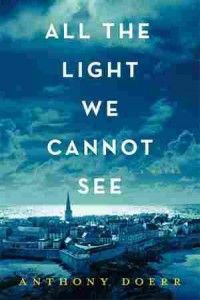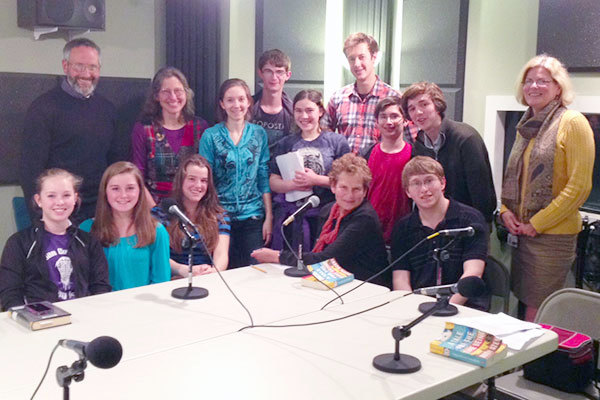High school kids to discuss an “adult” novel: “All the Light We Cannot See”
It’s spring at NCPR and time to bring a group of high school students into the studio to talk about a book. This year we’re discussing Anthony Doerr’s popular new novel, All the Light We Cannot See, a WWII story set in Germany and France.
All the Light We Cannot See is marketed as an adult book although both the main characters are teenagers who age and grow. When I first met with the high school kids I asked them if they thought Doerr’s new novel was actually a Young Adult novel in disguise. Hmm… is that a belittling statement for a 530-page book filled with drama and intrigue and carnage and honor? We didn’t come to any grand conclusion on this.
What we have discovered is that All the Light is an intriguing read for teens, that the young characters are well-drawn, and we cared for them enough to worry what would happen as the war drew to a close. The German boy, Werner, desperately wants to become a scientist in the Nazi ranks and as he ages he makes decisions that are not always honorable. We wondered if each of us would have had the strength to say no to the cruelty and terror Werner found as he trained to fight. Peer pressure and brutal retaliation kept most of the German boys quiet about the injustices, or active participants in them.
 And we wondered, is it more compelling to read historical fiction about a time and a place we have studied or is it better to know nothing at all about the location and outcome of the story? We know who won WWII but the suspense in the story partly revolves around the characters staying alive long enough to witness the end. A story that is part of the giant history of WWII contains much unwritten information that readers already know.
And we wondered, is it more compelling to read historical fiction about a time and a place we have studied or is it better to know nothing at all about the location and outcome of the story? We know who won WWII but the suspense in the story partly revolves around the characters staying alive long enough to witness the end. A story that is part of the giant history of WWII contains much unwritten information that readers already know.
Have you read this novel? Did the teen characters appeal to you? Some of the students found the sub-plot about a “cursed” diamond a great part of the forward arc of this story. Some of us found that part of the book distracting and a little silly.
We will record our last book discussion on Monday, April 27 at the NCPR studios. It won’t be live, but we’d love to know what you thought of this epic of a novel. And maybe you have a question or two for our young readers. Leave a comment and we’ll include you in the conversation.









WWII is often considered America’s “good war”, and by extension, America’s foes in that war have been long portrayed as “evil.” Not surprisingly, it has been hard for generations of Americans since to wade through the complexity of understanding the dilemmas of those living in an Axis country and struggling to live honorably. What insights did you gain as readers of this novel?
How possible is it for someone to live in a system and maintain the ability to recognize its flaws? And further, how does a young person with a bright future live and pursue interests and passions if s/he suspects that the social system is flawed? What does it cost or require of a person to recognize and challenge the system in which one comes of age?
Is it possible for those that do not experience this dilemma (or who have had losses due to the actions of the society in question) to understand it? What conditions are necessary for ALL involved to heal?
Is this story pertinent for contemporary global (or American) society?
Thank you Thinking!
Great questions for anyone to ponder, and it will be interesting what the kids have to say.
In my reading as preparation for studying this book I read an interview with Anthony Doerr where he admitted he’d never thought much about what it might have been like to have been a young German soldier in WWII until he saw a vivid photo of a very young soldier, a boy maybe not even fifteen. That visual may have been the beginning of his character Werner.
And of course the one young man who does stand up for what he believes in while at the Nazi school ends up with permanent brain damage. Not exactly a hopeful image.
I meet with the students tomorrow and we’ll begin to tackle the bigger questions that surround this book.